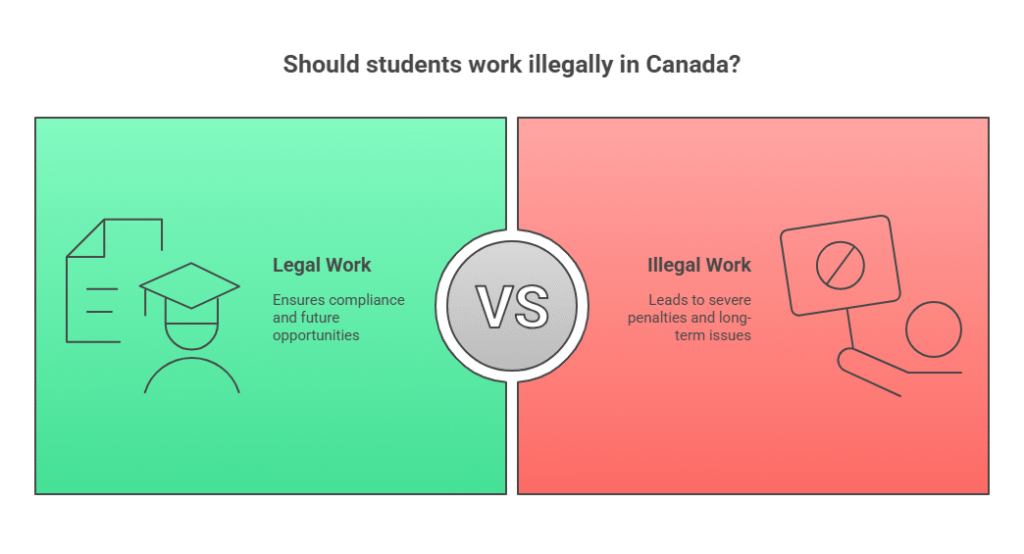International high school students in Canada often ask: ‘Can I work here?’ The answer is generally no, with one critical exception: government-approved co-op programs.
Canadian immigration laws clearly define what international minors can and cannot do regarding employment. International high school students face extremely limited options, particularly when it comes to part-time jobs, volunteering, and co-op programs.
The role of these work limitations is to learn about them in order to evade problems with visas, legal complications and subsequent barriers to immigration.
In this guide, we’ll break down everything students and parents need to know from IRCC guidelines and co-op permits to provincial age limits and volunteering options.
Can International High School Students Work in Canada?
Can international high school students work part-time in Canada is a topic that often confuses families, as such work is only allowed under specific co-op or academic programs. International high school students cannot work off-campus; post-secondary students have broader rights
This is in line with the Canadian policies on immigration that impose high interest in academic achievements among the minors and limit working to cases where it is directly linked to a school necessity (such as a co-op experience). Parents should note that Unauthorised work violates study permits, risking deportation. This guide explains whether international high school students can work in Canada under 2026 rules.
Eligibility Overview and Work Permit Rules
IRCC explicitly prohibits international high school students from working off-campus without authorisation.
Canadian immigration regulations clearly define which study permit holders can work and under what conditions. For high school students, the rules are particularly strict.
IRCC Guidelines for High School Study Permit Holders
According to the provisions of Immigration, Refugees and Citizenship Canada (IRCC) visa, it is mandatory to note that only international students studying in the post-secondary DLIs (Designated Learning Institutions) are permitted to enjoy the option of working off-campus without a separate permit. Certain hours are strictly put on international high school students working in Canada, and they are limited to the hours that are granted by an approved co-op or internship program.
For high school students:
- You are not automatically allowed to work off-campus.
- No 20-hour work allowance like college or university students.
- Part-time jobs are not legal unless a separate co-op or work permit has been granted.
IRCC Guidelines (2026 Update):
- Study permits explicitly state: “This permit does not authorize off-campus employment”
- High school students cannot work off-campus; only post-secondary students may work 24 hrs/week during academic terms”
- Part-time jobs are illegal without a co-op work permit
Co-Op Work Permits: The Only Legal Pathway for Minors
Requirements for approval:
- Mandatory medical exam if working with children/seniors
- Proof of program integration (letter from DLI-approved school)
- Placement cannot exceed 50% of total study time
Can International Teens Work Part-Time or Weekends?
Despite growing demand for part-time opportunities, can international teens work during high school in Canada remains a regulated issue governed by strict immigration policies. Per IRCC, 62% of minor work permit refusals stem from unapproved co-op placements
Part-Time and Weekend Work Restrictions
No, international high school students in Canada cannot work part-time or on weekends unless they have a co-op work permit linked to their school curriculum.
Important points:
- Even informal work (babysitting, delivering flyers) may violate your study permit conditions.
- There are no automatic work rights for minor students.
- Violations can lead to the revocation of your study permit or future visa rejections.
2026 Compliance Alert:
DLIs must report non-enrollment to IRCC within 30 days, increasing scrutiny of student activities.
Legal Age and Provincial Variations
Canada’s provinces set different minimum working ages, but this only applies to Canadian citizens and permanent residents, or international students who already have proper work authorisation.
Minimum Legal Working Age by Province
Here’s a quick comparison of the legal working age across major provinces:
| Province | Legal Work Age | Notes |
| Ontario | 14+ | Must be non-hazardous work |
| British Columbia | 15+ | With parental consent below 16 |
| Alberta | 13+ | Restricted roles for 13–14 |
| Quebec | 14+ | CAQ authorization required |
| Manitoba | 13+ | Permit needed for under 16 |
Sources: IRCC Work Conditions for Students , BC Child Employment Standards
disclaimer: “These ages apply only if work authorization exists”
Minor Status and Guardian Restrictions
Can minor international students work in Canada legally depends entirely on whether their study program includes a government-approved co-op component. Minor work permit restrictions make it essential for international high school students to understand that they cannot engage in any employment unless explicitly authorised. Most international high school students in Canada are minors (under 18 or 19, depending on the province). This adds extra restrictions:
- They require designated guardianship arrangements if living away from their parents.
- Cannot sign employment contracts without parental or guardian approval.
- Schools and guardians are responsible for ensuring students comply with immigration laws.
What About Volunteering or Unpaid Work?
Only students enrolled in DLI-approved co-op programs are eligible to apply for a co-op work permit that legally allows them to gain hands-on experience during their studies. Many international students wonder if they can volunteer to gain experience without pay. While volunteering is more flexible, it still comes with conditions.
Volunteer vs. Unpaid Work: What’s the Difference?
Volunteering:
- Food banks or community cleanups
- Charity fundraising events
- Religious organization activities
Unpaid Work/Internship:
- Unpaid roles displacing paid staff violate IRCC rules, regardless of intent
- Business “trial periods”
- Any role providing commercial benefit
Risk of Working Illegally

Some students and parents mistakenly believe occasional or cash jobs are harmless, but IRCC monitors visa compliance closely.
Consequences of Unauthorised Work
- Immediate study permit revocation
- Inadmissibility for 5+ years (Immigration and Refugee Protection Act Section 186(1))
- Permanent Record in IRCC Global Case Management System
- School expulsion
Real Student Insight:
“High school students can’t work—period. Don’t risk it.” – CanadaVisa Forum Moderator
Real Student Scenarios and Q&A
What Students Say on Reddit, CanadaVisa, and Forums
- “Can I work in a pizza place after school?” – No, unless it’s through a co-op program with a permit.
- “Can I deliver newspapers on weekends?” – Not allowed unless you have a valid work permit.
- “My school has a volunteer club. Can I join?” – Yes, if the activities are unpaid and community-based.
These community insights show that the only safe and legal path is through authorised programs and co-op work permits.
Maria, a Grade 11 student from Brazil, secured a co-op permit through her Toronto high school’s culinary program. She worked 15 hours/week at a licensed restaurant under chef supervision. Her principal confirmed: “Without the co-op permit tied to her OSSD credits, this placement would violate her study permit.
Transition to Post-Secondary: (2026 Rules)
An OSSD academy is a high school or institution accredited to deliver the Ontario Secondary School Diploma program, helping students meet university entrance requirements in Canada and abroad through a flexible, internationally recognised curriculum.
Once an international high school student graduates and enrols in a Canadian college or university, the rules change significantly.
Key changes after graduation:
- 24 hours/week off-campus work during academic sessions
- Full-time work during scheduled breaks
- PGWP eligibility: Requires post-secondary graduation (high school programs ineligible)
2026 Policy Alert:
All new study permit applications require Provincial Attestation Letters (PALs).
Learn more about international school Canada and the Ontario Secondary School Diploma (OSSD).
Comparison Table: Work Types and Legal Status
A scholarship to study in Canada can significantly reduce tuition costs for international students and is offered by many public and private high schools based on academic merit, leadership, or financial need. It is important to comprehend what forms of labour are legal for international high school students in Canada so that the study permit conditions are not violated. Although co-op placements are acceptable under certain conditions, the rest of the jobs, including weekend or part-time occupation types, are strictly forbidden. The table presented below characterises various types of work and explains their legal status for international high school students. This should be studied by parents and students before they look at any job offer.
| Work Type | Allowed for High School Students? | Conditions |
| Off-campus job (e.g., restaurant) | Not allowed | Unless co-op permit is issued |
| Co-op internship | Allowed with permit | Must be part of the curriculum |
| Volunteer work (non-profit) | Allowed | Must be unpaid and not for commercial gain |
| Weekend part-time job | Not allowed | Even on weekends unless part of co-op |
| Babysitting/delivery | Not allowed | Considered work under IRCC |
Step-by-Step Guide for Students & Parents
Successfully navigating the rules around student work in Canada requires careful planning and strict compliance with immigration guidelines. Here’s a detailed step-by-step guide to help international high school students and their parents stay informed and follow the legal route:
Step 1. Review your study permit:
Start by carefully reading the conditions stated on your study permit. Most high school permits do not grant automatic work rights, unlike those issued for post-secondary students. If you’re unsure, check the remarks section of your permit or consult the IRCC website to verify any clauses about work eligibility. Understanding your permit is the first step to staying compliant with Canadian immigration rules.
Step 2. Speak to your school counsellor:
Reach out to your school’s international student advisor or academic counsellor. Ask if your school offers a recognised co-op or experiential learning program that includes a work component. If such a program exists, request documentation or confirmation in writing, as you’ll need this for your co-op work permit application. Remember, not all high schools offer these programs.
Step 3. Confirm Designated Learning Institution (DLI) Status:
Ensure your school is a Designated Learning Institution (DLI) approved by the Canadian government. Only students enrolled in a DLI with an eligible co-op program can apply for a co-op work permit. You can search for your school on the official IRCC DLI list to confirm eligibility. Without DLI status, no work authorisation in co-op or otherwise it is possible.
Step 4. Apply for a co-op work permit:
If your school and program qualify, submit an application for a co-op work permit via the IRCC portal. You’ll need a formal letter from your school stating that the work placement is a required part of your academic program. Include all necessary documents, such as your valid study permit, passport, and school enrolment proof. The processing time may vary, so apply well in advance.
Step 5. Do not work until permit approval:
Even if you have a job offer, you cannot begin working until your co-op work permit is officially approved by IRCC. Working without proper authorisation is a serious violation of your study permit conditions. It could affect your ability to remain in Canada or apply for future visas, work permits, or permanent residency. Always wait for legal clearance before starting any job, even unpaid work.
Conclusion
So, can international high school students work in Canada? In most cases, the answer is no, unless through a structured co-op program with proper authorisation. While it may be tempting to take up weekend or informal jobs, doing so without a work permit can severely affect your future in Canada. Use IRCC’s official tool to check eligibility.
For those considering long-term education in Canada, focusing on academics during high school and transitioning to post-secondary for work opportunities is the safest, smartest path.
Important**: Immigration rules change frequently. Consult a [Regulated Canadian Immigration Consultant (RCIC)] for case-specific advice.
Frequently Asked Questions About Can International High School Students Work in Canada
1. Can international students work in Canada after high school?
Most high school students cannot work unless part of a co-op program with a valid work permit. However, college and university students with valid study permits can legally work up to 20 hours per week off-campus during regular semesters.
They can also work full-time during school breaks (like summer or winter holidays). Jobs are available on campus, in hospitality, retail, and even tech roles, depending on skill levels. Having Canadian work experience also helps with permanent residency applications later on. But for high school students, focus should remain on academics unless work is legally authorised.
2. How much can a student earn per month in Canada?
International students in college or university can earn CAD $800–$1,600 per month, depending on hours worked and location. The minimum wage varies by province -for instance, Ontario’s minimum wage (currently $16.55/hour as of 2024 – verify 2026 rates via the [Ontario Ministry of Labour]).
Most students work part-time in customer service, food delivery, or tutoring. Students working the legal maximum of 20 hours/week could earn $1,200+ monthly before taxes. However, it’s important to note that income taxes apply, and students should file tax returns annually. Those in co-op roles or technical internships can earn significantly more, especially in provinces with a higher cost of living.
3. Which part-time job pays the most in Canada?
Some of the highest-paying part-time jobs in Canada for students include tutoring, freelance design, IT support, language instruction, and digital marketing roles. Students with in-demand skills like coding or fluency in multiple languages can command rates of CAD $25–$40 per hour or more.
University students often find on-campus jobs in research labs or administrative departments, which also pay well and offer flexible schedules. Private tutoring (especially for math, science, and English) can be especially lucrative, depending on your academic background. Keep in mind that to access these opportunities legally, your study permit must allow off-campus work.
4. Which is the highly paid industry in Canada?
Canada’s highest-paying industries include healthcare, technology, engineering, finance, and skilled trades like electricians and heavy equipment operators. For students, entering these sectors often begins with a co-op placement or internship during post-secondary education.
Technology roles like software development, cybersecurity, and data analysis are especially in demand in provinces like Ontario, British Columbia, and Alberta. Salaries in these sectors often start around CAD $60,000–$80,000/year for entry-level roles and grow rapidly with experience. These industries also offer good immigration pathways for international graduates through the Post-Graduation Work Permit (PGWP) and provincial nominee programs.









